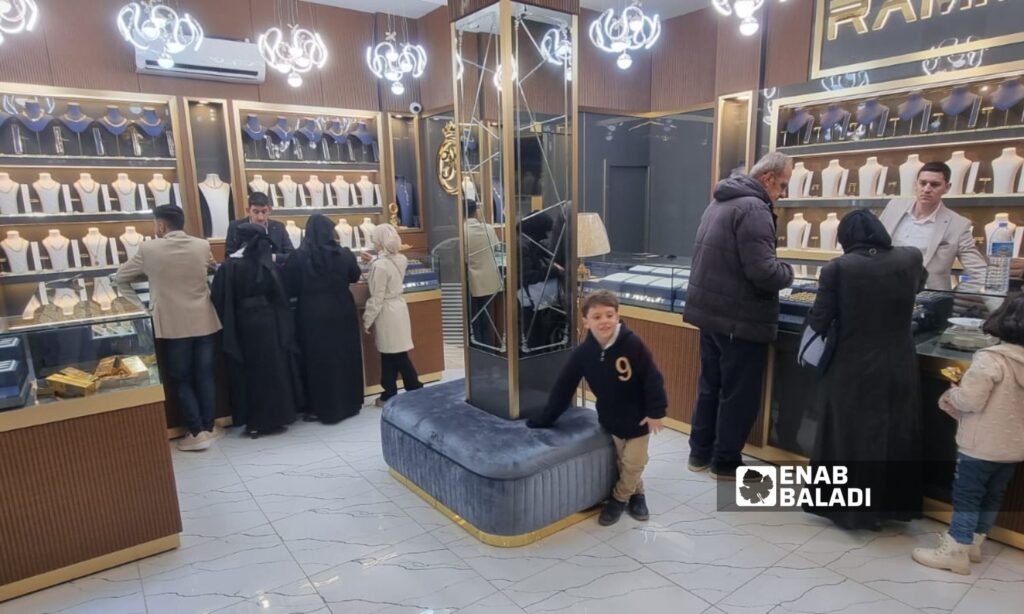Enab Baladi – Jana al-Issa
This April, a special gold market opened in al-Dana city, Idlib province, northern Syria. It is the largest of its kind in the region, with 30 stores increasable if future expansions are needed.
The market is designed with high-quality decorations, which some believe may not correspond with the sales volume that merchants will achieve, considering the residents’ weak purchasing power and their focus on spending primarily on basic needs.
Security encourages investment
Ammar Hajj Hamidi, a jeweler in al-Dana city, preferred to open a second branch of his store located in the city center at the new market for several reasons, including the “ideal” location of the market for jewelers and being away from the congestion inside the city. Factors related to the level of security available at the new market also played a part.
Hamidi believes that the market’s location on al-Dana’s agricultural road is good for sales activity, especially as many shopping malls have opened near this location, becoming a destination for many customers from across northern Syria.
According to Hamidi, important factors that encouraged jewelers to open their shops in the market include a dedicated security detachment for monitoring movement within the market, apart from the presence of 40 surveillance cameras, besides the cameras that store owners will place inside their stores, as well as the provision of modern alarm systems that operate in emergencies.
Jewelers in north Syria consistently fear for their goods, which are prime targets for theft, making security a main factor in determining their shop locations.
The inauguration of the new market was conducted by Joud for Contracting company, which completed the sale of a number of stores, with four immediately commencing sales in the market. A further inauguration is expected later under the sponsorship of the Jewelers’ Association, with more than 20 stores being prepared for opening in the coming period.
Sales exceed expectations
Wael Ramah, a jeweler at the new market, stated that the opening, attended by the head of Idlib’s Jewelers’ Association and many merchants, jewelers, and money changers from across northern Syria, has seen sales exceed jewelers’ expectations, particularly during the initial days following the opening. He considered that having many jewelers in one place creates competition and motivates them to produce distinctive gold pieces.
Specificity requires a single market
Musab al-Aswad, head of the Idlib Jewelers’ Association, told Enab Baladi that the specificity of jewelers’ work and the high value of their goods necessitate their presence within a single market to facilitate security and protection.
Al-Aswad added that what distinguishes al-Dana’s gold market is that it was specifically designed for jewelers, in terms of design, organization, protection, and security measures, making jewelers feel secure and enthusiastic about competition.
The Idlib Jewelers’ Association, a professional association founded in 2017 and announced in 2020, mainly supervises the regulation of gold standards and protects citizens from fraud. It also regulates gold prices by issuing daily pricing, ensuring jewelers adhere to the set prices.
Additionally, the association has a dedicated number for receiving and monitoring complaints about the gold markets in northern Syria.
Al-Aswad explained that there are two main gold markets in Idlib province; the first is located in Idlib city, and the new one in al-Dana city, which plays a crucial role in linking the gold stores in al-Dana and Sarmada, facilitating the association’s supervision over the markets.
In Idlib province, gold of “21” carat is predominantly available, from which most of the pieces in the market are made. “24” carat is reserved for bullions and ounces, and “14” carat is used for some delicate pieces that are given as gifts to children. However, “18” carat gold is not available due to a lack of demand from customers.
Positive, yet not a priority
Yahya al-Sayyed Omar, a researcher in political economy, told Enab Baladi that organizing any economic activity is important and positive, and having a market specialized in a specific economic activity is a form of organization that ensures the rights of both merchants and customers, contributing to the growth of this market. He affirmed that, theoretically, such organization is beneficial, especially if linked to a regulating guild.
The importance of the market emerges from the importance of gold itself, being a significant asset and a support for monetary stability, and such a market ensures limiting manipulation of gold, whether in terms of prices or quality through adulteration of standards or weight, thus protecting merchants, craftsmen, and customers.
All these aspects are important; however, despite the significance of gold and the necessity to organize its market, it is not considered an economic priority in northwest Syria, according to Omar. He noted that the beneficiaries of this market, whether merchants or buyers, are few, especially given the high rates of poverty and unemployment. He suggested that there are other activities with higher urgency and priority that should be supported, such as expanding markets for agricultural products or livestock, which would serve a larger percentage of the population as producers or consumers.
Enab Baladi’s correspondent in Idlib, Anas al-Khouli, contributed to this report.











